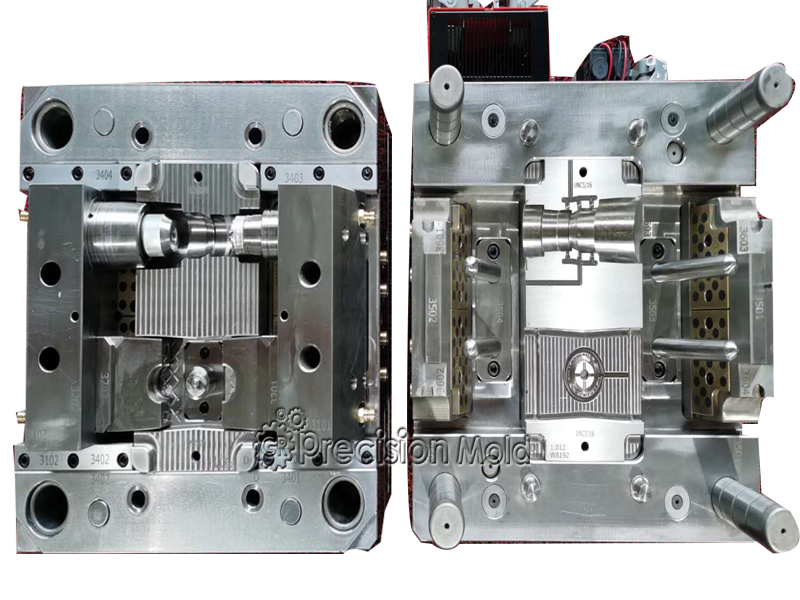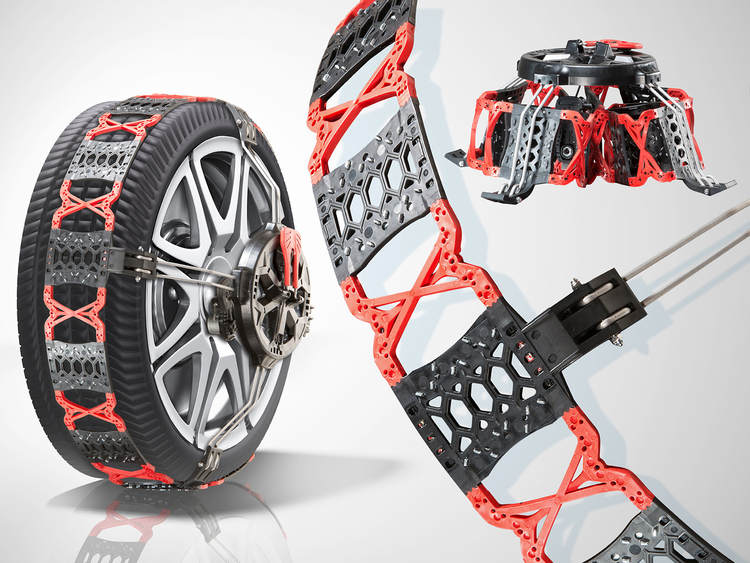Kayla Whitesel is a dedicated Manufacturing Engineer with a Bachelors of Science degree in Industrial Engineering from Iowa State University. Her career in manufacturing was motivated by a desire to make a meaningful impact in the medical field. Amid the diverse domains of manufacturing, the healthcare industry stood out as an area where efficiency is paramount.
Throughout her academic years, the concept of efficiency resonated deeply and in her role as a Manufacturing Engineer at Accumold, she collaborates with professionals who share a passion for maximizing efficiency. Whitesel’s team embraces change as a constant, recognizing its potential to drive progress and innovation and continually challenge conventions. She strives to make a difference in the dynamic world of manufacturing. Large Plastic Molds

Outside of work, you’ll find her lacing up a pair of running shoes, exploring new places, and experimenting with exciting recipes in the kitchen.
What initially attracted you to the medtech industry? How has your perspective on the industry evolved over the course of your career?
During the summer preceding my senior year of high school, I had the privilege of attending an engineering conference held at the University of Nebraska at Omaha. This three-day event provided high school students like me with a unique opportunity to explore various engineering disciplines and engage with companies specializing in them.
The conference’s final presentation left a lasting impression on me. It was delivered by a company committed to optimizing existing processes to make them eco-friendly and highly efficient. The presenter showed a lush forest, progressively zooming in until it focused on a single plant. At the micro-level, they demonstrated how the intricate processes of plant survival had been optimized to an astounding 99.9%, benefiting the surrounding ecosystem. This revelation showcased how the principles of efficient evolution in the natural world could be applied to enhance existing business operations – a perspective that expanded my horizons.
I realized that I could choose an engineering degree that would empower me to work on projects aimed at optimizing and transforming specific fields. My pre-existing interest in the medical field seamlessly merged with this newfound passion, as I envisioned a career dedicated to enhancing and streamlining existing processes in healthcare. I have been able to learn how the medical parts field operates, and what is needed to bring a medical product to market. My perspective of the MedTech industry is growth. The industry is ever growing, with the use of various technologies and design of medical parts. Professionals in this industry are challenging the norm and designing applications to better fit the needs of the specific medical field, and it is inspiring to see.
As a seasoned professional in the industry, how do you envision the future of medtech? What emerging technologies or trends do you believe will have the most significant impact?
The future of MedTech is experiencing exponential evolution, particularly in its integration with artificial intelligence (AI). This transformative change is fundamentally driven by the continuous acquisition of data, a process greatly facilitated by technological advancements. However, the sheer volume of data collected in the medical field would require an extensive analysis, a task that could consume multiple hours for a single engineer. The application of AI to analyze this data not only streamlines the process, but also holds significant value in the medical domain where time is a critical factor. While AI is currently in its nascent stages of development across various industries, I firmly believe that it will exert a profound impact in the years ahead.
From your experience, what are some of the key challenges that medtech engineers are likely to face in the coming years? How can professionals in the industry prepare for and navigate these challenges effectively?
The advancing technologies of the medical industry will keep climbing, and with new technologies offer new learning. Some challenges that will arise will be around utilizing these advancements, such as implementation. Another challenge is space, with ever changing technologies arising will bring challenges of space and where to support these devices.
To prepare for these changes, I believe it is keeping up with the conferences where these new milestones are shown. This keeps all professionals in the loop, as well as thinking about future questions. The virtual options, as well as recorded sessions over specific topics really help when there are scheduling conflicts.
In your opinion, what areas or applications within MedTech have the greatest potential for growth and innovation? Why do you consider them promising?
Medical manufacturing has experienced consistent growth in success rates and the enhancement of existing product lines for several years. However, the most promising realm for innovation, in my opinion, lies in product design. It may seem ironic that this growth is occurring as medical parts become smaller in size, but this trend is primarily driven by functional considerations in device assembly and the pursuit of medical advancements.
In most medical devices and applications, the drive towards smaller components is driven by the need to improve the result. This may involve enhancing surgical procedures with more refined devices or achieving better compatibility between products during assembly. Consequently, we’ve witnessed a reduction in the size of several medical components. At Accumold, our specialization lies in micro features, tolerances, and size. We frequently receive inquiries about how small we can go in terms of micro features, and I believe this is a promising indicator for the future, reflecting the innovative strides being made in the MedTech industry.
As technology continues to advance rapidly, how do you think medtech engineers can stay ahead of the curve and ensure they are equipped with the necessary skills and knowledge?
To maintain a competitive edge, engineers must continually keep in the know of upcoming technologies. Attending trade shows that cover emerging technologies or showcase novel applications of existing ones is essential for staying informed. These events provide a wealth of knowledge and resources, including technical presentations that explain the purposes and functionalities of new technologies.
Moreover, I believe that having an introductory understanding of emerging technologies is crucial. For instance, grasping the fundamentals of new coding languages that have underpinned the success of AI is vital for MedTech engineers. This knowledge equips them with the background necessary to innovate and integrate these new technologies into emerging medical applications.
From a broader perspective, how do you see the role of medtech engineering in shaping the future of healthcare? What impact do you anticipate it will have on patient care and outcomes?
I believe that MedTech Engineering is the pivotal part in shaping the future of healthcare. Efficiency in healthcare delivery is an ongoing metric that demands improvement to enhance patient care. The ultimate objective is to test and implement new developments that elevate patient care, be it through devices expediting test result turnaround or cutting-edge technologies aiding in surgical procedures. While working alongside medical professionals in all areas of healthcare, from ICU nurses and cardiologists, I am convinced that engineers are at the forefront of creating this future. Every process tested and refined contributes to shaping a healthcare focused on patient care.
Considering the increasing importance of interdisciplinary collaboration, how do you think medtech engineers can effectively collaborate with professionals from other fields, such as medicine and computer science, to drive innovation in the industry?
Cross-functional collaboration plays a pivotal role in driving project advancement, a principle that holds true even in the complex industry of MedTech. Given the diverse array of specialties required for successful projects in this field, there is significance of MedTech Engineers expanding their horizons through training in various disciplines and specialties. Numerous training opportunities exist, allowing engineers to gain introductory insights into these different fields. For example, there could be bootcamp courses that are for a few days that explore introductory principles of computer science. This expanded knowledge equips engineers to bring fresh perspectives and ask more nuanced questions, thereby enhancing the innovative capacity of cross-functional teams.
How do you think diversity and inclusion can contribute to the advancement of medtech engineering?
To foster a collaborative environment that breeds innovation, diversity needs to be aligned as the fresh perspectives it brings are crucial for driving growth. In the ongoing development of the MedTech Engineering field, diversifying, and embracing various cultures can greatly enhance creative thinking and teamwork. It’s truly encouraging to witness the increasing presence of women in the engineering realm. As a young woman in this field, I find it inspiring to witness the progress made in promoting gender diversity and inclusion. The path continues to expand, and engaging in discussions with women who have firsthand experience of this growth keeps my ambition alive, not only for myself but also for other young women pursuing careers in engineering.
How do you foster a culture of innovation within your team or organization?
Continuous growth/improvement is essential in the manufacturing industry, and achieving this growth requires fostering an innovative environment. At Accumold, we prioritize innovation as one of our key performance indicators. I have developed a system within our ERP (Enterprise Resource Planning) system to facilitate and drive innovation projects from their initial stages through to successful implementation. This system provides transparency regarding the current stage of each innovation project and outlines the necessary next steps.
Innovation often parallels research and development, where projects may sometimes encounter delays. To maintain project momentum, I actively engage in discussions and action items related to innovation. To keep innovation at the forefront of my project teams, I consistently ask the question “why.” Since each of our projects is custom and can be molded in various ways, determining the optimal molding approach occurs during the design for manufacturability phase. These projects challenge our team to think critically about the most efficient molding methods for each part. During these discussions, innovation is always a prominent consideration. If there is a potential capability or enhancement that could improve the molding process, we thoroughly evaluate it for its innovative potential.
Subscribe to Medical Design & Outsourcing. Bookmark, share and interact with the leading medical design engineering magazine today.
DeviceTalks is a conversation among medical technology leaders. It's events, podcasts, webinars and one-on-one exchanges of ideas & insights.
The Medical Device Business Journal. MassDevice is the leading medical device news business journal telling the stories of the devices that save lives.

Abs Molding Copyright © 2024 WTWH Media, LLC. All Rights Reserved. The material on this site may not be reproduced, distributed, transmitted, cached or otherwise used, except with the prior written permission of WTWH Media LLC. Site Map | Privacy Policy | RSS